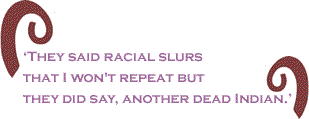
The following article
was posted at Indian
Country Today on October 16.
Amnesty International
hears testimony on racial profiling
 TULSA, Okla. - Racial
profiling by law enforcement still exists according to testimonies
by Native Americans September 30 before Amnesty
International USA at the Greenwood Cultural Center.
TULSA, Okla. - Racial
profiling by law enforcement still exists according to testimonies
by Native Americans September 30 before Amnesty
International USA at the Greenwood Cultural Center.
The hearings, designed by the Domestic Human Rights Program,
are intended to collect new data on the possible "ineffectiveness
of law enforcement policies that focus on race or ethnicity."
AIUSA heard from victims of racial profiling from Native American, African
American, and Islamic communities in Oklahoma. Direct testimony, face-to-face,
is a key component to AIUSA's national series of public hearings on racial
profiling.
"From my position, the threat and humiliation of racial profiling appears
to be an everyday experience for the Oklahoma Indian. And if the following reports
are true they paint a nation-wide problem of racial profiling by law enforcement
at every level," said Louis Gray, president of Tulsa Indians Against Racism,
who spoke to the panel at the beginning of the formal hearing.
"This is the lifeblood of Amnesty (AIUSA) - to be able to hear and communicate
directly from the people," said Gerald Lemelle, executive director of Amnesty
International USA.
Direct testimony from Indian victims touched on racial profiling on several
levels and left many of the AIUSA panelists speechless.
Among those to testify as a victim was Lou Spencer, from the Euchee and Creek
Nations. Spencer's testimony brought members of the AIUSA panel and people
in the audience close to tears as she described the limited events known
to her family that led to the death of her stepson.
"This is hard because I still have anger in me," she said through tears. "He
could not walk. He was drug, police were on both sides of him, but he was being
drug - just like a dog."

In October 2001, Shane Spencer, then 26, was arrested at
or near his home located a few blocks from the David Moss
Detention Center where Shane was
eventually taken two hours after his arrest. Tulsa police responded to
a disturbance call and hand-cuffed Shane then loaded him
into a paddy-wagon,
according to the limited information Shane's family has able to gather.
"Where was he at between 11 p.m. and 1:18 a.m.? These unknowns are what
trouble our family. They said racial slurs that I won't repeat but they did say,
another dead Indian," Spencer struggled through tears to explain the scenes
caught on video tape by a surveillance camera. "It's all on tape so
they cannot lie about what was said about him while he lay lifeless on the
floor."
Shane (Seminole, Creek, Osage, Cherokee, and Blackfeet) laid on the floor "lifeless" for
several minutes while officers laughed and joked around his body. A nurse
from the jail refused to treat Shane and insisted the officers call for
more medical assistance because Shane needed emergency care. After finally
being
examined he was pronounced dead at 1:18 a.m. - the exact time he arrived
at the jail.
Shane's family is filing a lawsuit against the Tulsa Police Department
and the jail where he died.
Spencer's testimony left the panel quiet with disbelief.
"I am finding it hard to find the words to respond. No one in this country
should ever die at the hands of those who are sworn to protect them and those
are the police," said the Honorable Timothy Lewis who served as the
moderator for the panel.
Tulsa police were invited to attend the hearings but were advised by legal
counsel not to attend.
"We talked to our Chief yesterday and he basically said that our legal counsel
advised at this time it would not be prudent for the department to participate
because of some legal issues the department has going on right now," said
Officer Andy Phillip from the Tulsa Police Department's Public Information
Office.
Phillip did say the department has on-going cultural sensitivity training
for all staff, supervisors, and officers.
"It's not a one-time thing. We've had it since '91 or '92. It's pretty much
available year-round. It's mandated by most departments," Phillips said
about cultural sensitivity training.
Mary Culley, from the Creek and Seminole Nations, spoke as an advocate
about the religious persecution of Indians by law enforcement. She talked
about
police cars lining country roads outside of their jurisdiction waiting
to harass Indians leaving cultural and ceremonial activities. Alice Whitecloud,
from the Cheyenne and Ponca nations, talked about harassment by law enforcement
because of tribal tags. Whitecloud is also a member of TICAR and longtime
activist for Native American Rights in Oklahoma.
Lori Penner, from the Cheyenne and Sac and Fox nations, spoke about
the first time her house was "ransacked" by law enforcement
from her community.
"On August 12, my door was broken down. They pointed guns at us and told
us to get on the floor. I had a gun at my head. I kept asking, what are you doing,
why are you doing this. They kept shouting, shut-up and be quiet," said
Penner.
Members of Penner's family were present during this first incident. Penner
is angered most by how the younger members of her family were treated.
"My 15-year-old daughter was jerked out of the shower and forced to stand
naked in front of three male officers. She was taken to her room to put some
clothes on where she had to get dressed in front of three officers. And my 6-year-old
grandson was forced to sit with everyone while the house was tore-up. The police
laughed and smirked at us when no drugs were found. One police officer had the
audacity to tell my daughter she cleaned-up nice and looks good for a 15-year-old
girl," Penner said.
Penner's home is still being monitored by one of the alleged offending
officers from Thomas, Okla. She said he continues to circle her home on
a regular
basis and her home has been forcibly searched twice since August 12.

Tulsa was the third city to host the series of public hearings.
Tulsa's race relations history between its African American
citizens and Anglo
citizens
was fundamental to bringing the international human rights organization
to the city. It was a logical location to hold the hearing said
one AIUSA panelist
referring to the Race
Riots of 1921.
"You might say, why Tulsa. Well, why not? Tulsa has a very powerful history
in regards to race relations. Anyone who has studied the history knows about
the race riots," said Lemelle.
By the end of hearing, the panel had gained a broader perspective of
race relations in Oklahoma which now includes the voices and concerns
of American
Indians.
"The Oklahoma experience is a difficult one. Life for Native Americans is
one built on institutional racism," Gray said speaking on behalf of TICAR,
victims and advocates. "We believe that when it is the goal of the
institution to minimize a people, they no longer exist as a real people.
If you are not
real, the offender believes he can do whatever he wants to you."
The victims and advocates spoke out against racial profiling and police
brutality for one reason - change.
"We want people to stop being quiet about this and we want the police department
to know they are supposed to protect us and help us when things are going bad.
But more than anything we want children to be educated about good cops and bad
cops. This has been going on for way too long - it needs to stop. Don't just
sit back and let things like this happen to our loved ones," Spencer said. "That's
why I testified. That's why I went public and that's why we've gone public.
When one family does it more of them will start coming out."





























